#it's not a dangai btw
Text
Why You Should Watch 君子盟 (张公案) | A League of Nobleman
Firstly yes it’s nobleman with an ‘a’ i.e. singular for some reason but yes unfortunately that’s the case.
Secondly yes this had multiple other names while it was still locked up in tencent storage but we finally have something, and a note that it’s loosely based on the novel 张公案 but there’s been a bit of drama between the author and the drama production, and in any case, the cases differ quite a bit. You can say we have a Chenghua’s 14th Year situation here where it’s closely related but veered off the original at some point to varying effects.

Summary:
Zhang Ping is a poor, orphaned scholar who has to sell noodles part-time to make ends meet. He has a brain for logical deduction and is personally smart with quite a good memory. He is selling noddles at his stall as usual and minding his own damn business when Lan Jue, a high-ranking officer second only to the Minister of the Ministry of Rites, uses him as a distraction in a case. Lan Jue is the son of an official who was framed 20 years ago for treason, and he has to become Minister of Rites in order to get closer to the truth of his father’s unjust death, but his status as the son of a guilty man means that no one wants to recommend and support him to become Minister of Rites. Moreover, he’s been in contact with an enemy state, the state that his father went to before his death - but the letters are intercepted by the other person who’s in line to become Minister of Rites as well. The other official sets up a case to frame Lan Jue for treason and to push him out of the running for Minister, and Zhang Ping, who’s dragged into this unexpectedly, cannot help but interrupt to solve the case(s) that happen.
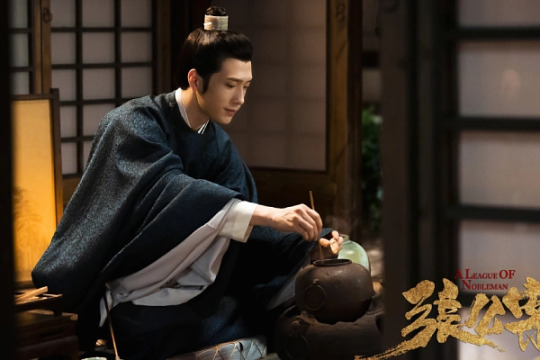
Initially, it’s Lan Jue against Zhang Ping, as while Lan Jue isn’t a bad guy, he has laid a lot of groundwork and plans behind the scenes and Zhang Ping who looks at everything in black and white, and insists on pushing for justice no matter the situation, is a hindrance to his plans. Slowly, through each case and being stuck with each other, Lan Jue realizes that he’s strayed too far from the path that his father once wanted him to be on, and the person he originally was, all to set up ruse after ruse to get to what he wants. Albeit he is justified in doing so as he desperately wants to clear his father’s name, but it takes Zhang Ping and a teacher of his to remind Lan Jue that no matter what, he cannot break the law for his own personal motivations.

Once they come to an understanding, Zhang Ping also realizes that Lan Jue and his friend Mo Wen are excluding him firstly to keep him safe, but also because Zhang Ping cannot seem to understand that there’s a time and place for everything, and his insistence at immediately solving crimes and cases especially when they’re targeted at Lan Jue and the treason case 20 years ago, will undo all the work he’s put in so far. So Zhang Ping decides to help Lan Jue, and promises that he knows what he’s doing this time if he’s involved.
Together, they unravel the truth behind Lan Jue’s father’s death, along with Zhang Ping’s noodle store colleague and Lan Jue’s only good friend, Mo Wen.
Details:
Total Episodes: 29 (10 have been released so far, with one episode released per day for non-members, and 10 episodes a week for VIP members)
Comes from a novel and there is a manhua publications as well, manhua art by 千二百

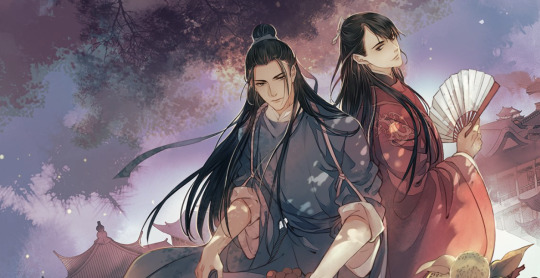
Why You Should Watch:
(1) ERM BROMANCE AND AN OT3 SHOULD ALWAYS BE A REASON TO WATCH ESPECIALLY IF THEY ARE ALL GUYS???
Between Lan Jue and his friend Mo Wen: “Between you and I there is no need for thanks”
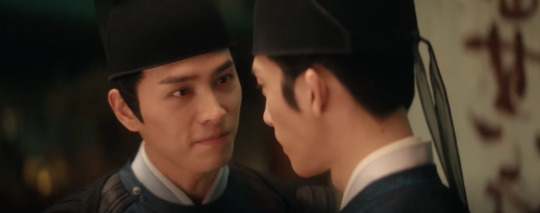
“I could handle it by myself but SOMEONE just had to ‘save’ me so I would have to owe him a favour”
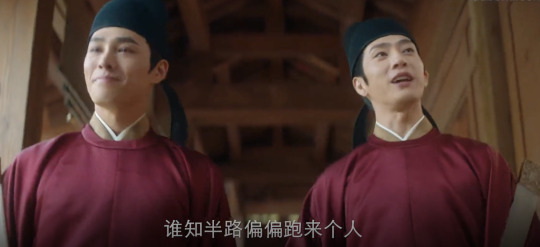
Fainting Zhang Ping and Lan Jue being all !!!!!!!!

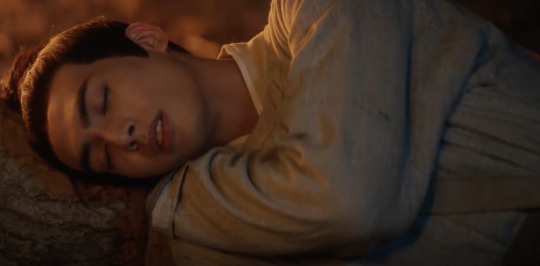
AND everyone rushes to Lan Jue’s house to give him gifts on 粽子节 because they wanna curry favours with him, and Zhang Ping is the only one who gives him proper dumplings.
“No matter how big or small the gift, I cannot accept them.”
And then Zhang Ping gives the dumplings to Chen Chou, not knowing that Mr. Lan would walk away and run back to his stall to find him and ask for his dumplings under the table, but they were gone by then
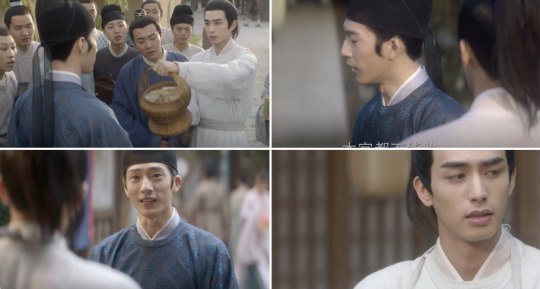
And what’s a bromance without a premature divorce right (Lan Jue stabs Zhang Ping, they agonize in the rain)


+ Yes Lan Jingyi is in this as Chen Chou and he’s fucking hilarious
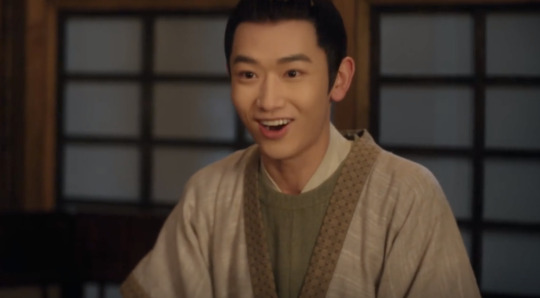
(2) Also Lan Jue and Zhang Ping Face-Offs + COMEDIC MOMENTS APLENTY
“You’re a scholar but you’re selling noodles here, are you perhaps facing some difficulty?” “Because I’m poor.”

“You’re not here to save him?” “No I’m not, I’m going now”
Lan Jue stuck with a noose around his neck and wolves waiting to eat him and Zhang Ping be like all nope not saving ya

Zhang Ping pronounced dead and then sits up in bed
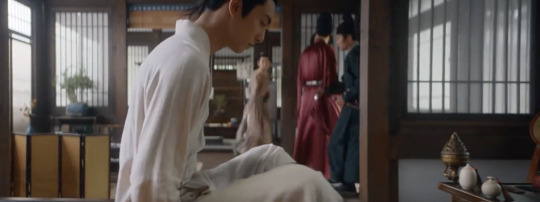

Zhang Ping using the dates that are placed in the toilet to get rid of bad scents into the porridge he serves Lan Jue


(3) THE CINEMATOGRAPHY IS GORGEOUS
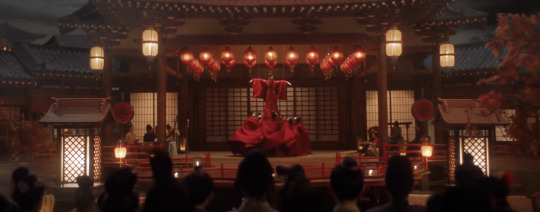
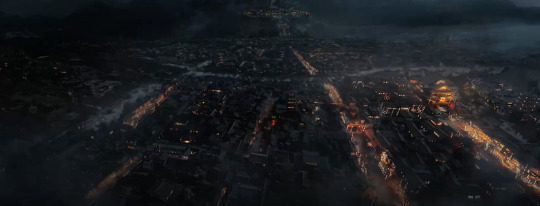
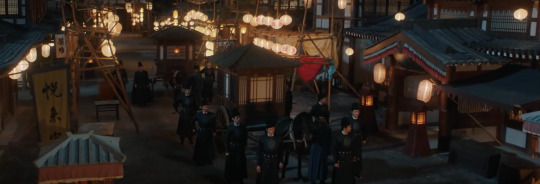

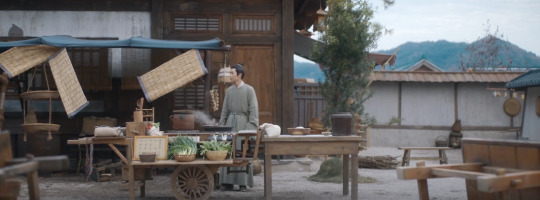
IS THIS A DANMEI/DANGAI?
No, it’s not, according to the author. The original novel had a lot of bromance and hinted at a relationship, but the author has specifically said this is no CP, not a danmei and the production itself should not even be considered a dangai (but the production went ahead and advertised it as such anyway and we all know how that turned out). She was pretty mad when she wrote the clarification post cuz people were asking her to put it under danmei classification on JJWXC. BUT Zhang Ping and Lan Jue can be seen as more than bros for sure.
#a league of nobleman#zhang gong an#张公案#jun zi meng#君子盟#song weilong#jing boran#lan jue#zhang ping#cdrama#it's super good#i'll add more bromance parts as i gif hahahaha#it's not a dangai btw#so i wouldn't use this as a benchmark for other actual dangais getting out of lockup
477 notes
·
View notes
Text
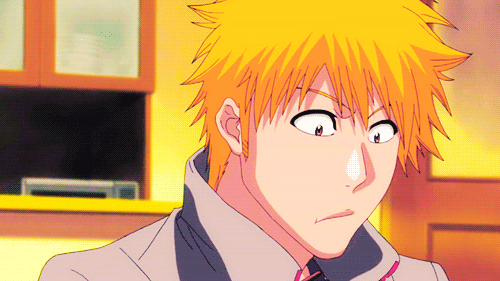
The What-If Forms
I've made a post or two about silly facts I recently learned off the wiki or youtube which are sourced from Tite Kubo's site "Klub Outside" and I made one going over just how crazy his biology is.
But I don't think we discuss the alternative scenarios enough. Ichigo is quite literally a little part of everything and he can potentially be anything in between.
And Bleach Brave Souls played around with that. For example;

Mastered Hollowfication
There's the mastered hollowfication version of Ichigo. This one is even closer to real than the rest thanks to Kubo revealing that, had Ichigo not became afraid of his powers, that his mask would've mirrored the one Hollow Ichigo wore during his Dangai training.
In essence, Ichigo could've freely wielded the form he used to kill Ulquiorra had he not gave into despair. This form here is that same concept but with an Arrancar twist of the mask being broken.
Then there's this one:

100% Fullbring
This form is just what would happen had Ichigo's fullbring never been stolen or had it been recovered. It's his Soul Reaper form clad in the totality of his fullbring.
A perfect blend of Hollow & Reaper manifested via Fullbring.
It's certainly visually interesting to me but it's still not the form I find most interesting. The form I find the most intriguing is actually Quincy Ichigo.

Quincy born in Black
Just look at this concept, the implications, the possibilities. The Wandenreich showed us that quincies can be a legitimate threat to the Soul Reapers. Granted, we still don't know if the army is in physical bodies or spiritual ones.
The very fact that some of members are 1000+ years old makes it hard for me to believe they are in a living human body but ya never know.
In Ichigo's case it makes the mind race with what mixture of powers he'd have. As a "true soul reaper" in the final arc Ichigo's quincy powers only summon Blut Vene or act as a counter balance to his Hollow powers.
You could see an inverse of that here.

Imagine with Me
How would Ichigo don this form? No clue, I don't think a scenario to explain this form was ever given. Perhaps he emerges from the Shattered Shaft like this, that'd be a fun Bleach AU to watch.
This form would be quite busted as well. If he was a quincy foremost he'd have power over reishi, the ability to absorb and mold it into weaponry.
His Blut Vene wouldn't be reactive/automatic and he may even have a spiritual form. Scarier still, Hollow Ichigo is in there. He may not manifest as a bootleg zanpakuto but he's still an internal source of power.
Meaning Ichigo, as a quincy, would not only draw power from around him but from within himself. Perhaps, like Yhwach, Ichigo even forms blades and swords out of reishi to battle forgoing a zanpakuto entirely.
Hell, you could even give his quincy form unique quirks. Such as the aforementioned spiritual body or maybe Ichigo's arrows have purifying properties to them.
Imagine how confused, perhaps annoyed, the soul reapers would be to see a quincy that can freely purify hollows like they do. Their whole justification for the Quincy genocide 200yrs prior to the show (about 800yrs after Yhwach's failed first war) was because quincies utterly destroy hollows thus creating an imbalance.
A quincy with arrows that purify the same way a zanpakuto does would be a quandary for them.
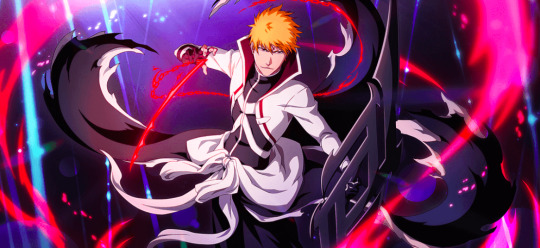
Quincies & Fullbring & Reaper
Then you have this image. I assumed it was a mixture of quincy and fullbring but upon research it seems to be a quincy infused with a soul reaper powers.
Which...Ichigo kinda is that already but it seems inversed. He's not a soul reaper with quincy qualities here but a quincy with reaper qualities instead. (the dominance is reversed)
But the idea of what he'd look like with fullbring as a quincy also intrigues me. It's not as compelling to me as Quincy Ichigo since this image here is just a mix of what he's already doing but it's visually interesting.
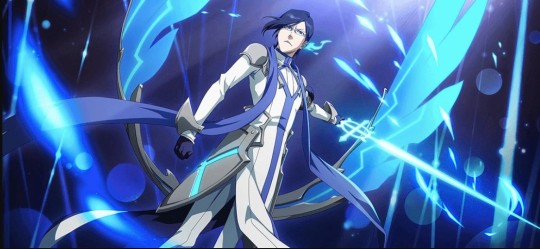
Reaper Uryu exists btw
I've rambled all I could. There's just too little on them but the ideas are interesting and I can see how it interests people even now. No, I had no real point.
I just find Quincy Ichigo intriguing as an idea since that official work of him exists. I'd even love a Bleach AU story where he emerges from the Shattered Shaft as a Quincy instead.
But that won't happen so I'm rambled out. But hey, before I go, enjoy this image I discovered while researching. ^^^
See that? That's Reaper infused Uryu. Have a field day, bye.
30 notes
·
View notes
Note
i suggest dangai ichigo as a potential ichiverse au, i feel like that form is fairly unique compared to ichigos other forms, you don’t see fullbring ichigo or eos ichigo cutting mountains despite those forms being implied to be stronger. kubo also never had him do a getsuga tensho in that form; the form in general just seems out of place in the wider bleach canon and even aizen had the wrong idea about it, being under the assumption that ichigo traded in his spiritual power for physical strength. on the same note, ichigo is uncharacteristically inexpressive which i think contributes to the forms unique-ness for lack of better word, but you do see him drop the facade post mugetsu^^
there was a line i found interesting in deicide i can’t remember what ch it was (around 410-20 ish?) where aizen planned to kill ichigos human friends just to gauge ichigos reaction. i realize this is turning into a what if aizen won scenario au which could also also a potential ichiverse au idea
(you don’t have to incorporate these ideas btw, i just had to get my fixation on this form off my chest bcuz i barely see anyone talk about it 😭)
OOOOOH I LIKE THIS IDEA! theres so many different variations to explore. theres some fun ideas here especially concerning how i want the main theme of arc 2 to go. dangai ichigo is severely underrated somehow bc he gets overshadowed by mugetsu we dont even have a second dangai ichigo unit its so sad
#ask#50offsoul#i aready know how arc 1 starts and ends its jusg the middle 😭#buttt arc 2 im thinking about already and i am absolutely introducing more#i could honestly mix this concept with another sort of concept i have for a variant#my sort of ethos is take a concept of an popular au and run with it as far as i can go#ichiverse au
4 notes
·
View notes
Note
i love it when other fic writers send me requests and its your fault (i mean that affectionately/anything but rudely/accusatorily) anyways the req u sent for ichigo x male reader-
u didnt gimme any genre or prompt (thats totally ok btw idm) so im assuming u js want me to write smth? i was wondering tho if u could resend it with a genre at least so i dont accidentally write something u dont want :<
Oh yes sorry about that. Just a question at first if you can do Ichigo x male Reader but happy to give the specific genre. I was thinking it is...😳...smut. The genre is romance but like modern grunge universe with their relationship as boyfriends/roommates. But you got to have this Ichigo...long hair Ichigo when he trains in Dangai omg😍. And Ichigo is the top in this story though really caring partner to date while male reader is the innocent bottom but loves it. Takes place in their apartment with Ichigo coming home from band practice (he's a bassist since he had a guitar in his room and had a guitar in the 2nd TYBW opening) and reader is like an art student still by studying to get his masters degree (Ichigo already graduated to focus on music). So I would say it is welcome home sex of Ichigo x Male Reader. Take your time, no rush.
1 note
·
View note
Note
Can you talk more about the usage of the word "wife" to talk about men in the BL context? I've noticed it in BJYX (particularly with GG), in the (English translations) of MDZS, and then it came up in your recent posts about Danmei-101 (which were super helpful btw) with articles connecting the "little fresh meat" type to fans calling an actor "wife." My initial reaction as a westerner is like "this is very problematic," but I think I'm missing a lot of language/cultural context. Any thoughts?
Hello!
First of all, for those who’re interested, here’s a link to the referred posts. Under the cut is arguably the 4th post of the series. As usual, I apologise for the length!
(Topics: seme and uke; more about “leftover women”; roster of feminisation terms; Daji, Bao Si & the origin of BJYX; roster of beautiful, ancient Chinese men; Chairman Mao (not part of the roster) ...)
[TW: feminisation of men]
In the traditional BL characterisation, the M/M (double male) lead pairing is essentially a cis-het relationship in disguise, in which one of the M leads is viewed as the “wife” by the creator and audience. This lead often possesses some of the features of the traditional, stereotypical female, but retaining his male appearance.
In BL terms, the “wife” is the “uke”. “Seme” and “uke” are the respective roles taken by the two male leads, and designated by the creator of the material. Literally, “seme” (攻め) means the dominant, the attacking / aggressive partner in the relationship and “uke” (受け), the passive / recipient (of actions) partner who tends to follow the seme’s lead. The terms themselves do not have any sexual / gender context. However, as male and female are viewed as aggressive and passive by their traditional social roles, and the attacker and recipient by their traditional sexual roles respectively, BL fandoms have long assigned uke, the passive, sexual “bottom”, as the “woman”, the “wife”.
Danmei has kept this “semi” and uke” tradition from BL, taking the kanji of the Japanese terms for designation ~ 攻 (”attack” is therefore the “husband”, and 受 (”receive”), the “wife”. The designations are often specified in the introduction / summary of Danmei works as warning / enticement. For MDZS, for example, MXTX wrote:
高貴冷豔悶騷 攻 × 邪魅狂狷風騷 受
高貴冷豔悶騷 攻 = noble, coolly beautiful and boring seme (referring to LWJ)
邪魅狂狷風騷 受 = devilishly charming, wild, and flirty uke (referring to WWX)
The traditional, stereotypical female traits given to the “uke”, the “wife” in Danmei and their associated fanworks range from their personality to behaviour to even biological functions. Those who have read the sex scenes in MDZS may be aware of their lack of mention of lube, while WWX was written as getting (very) wet from fluids from his colon (腸道) ~ implying that his colon, much like a vagina, was supplying the necessarily lubrication for sex. This is obviously biologically inaccurate; however, Danmei is exempt from having to be realistic by its original Tanbi definition. The genre’s primary audience is cishet females, and sex scenes such as this one aren’t aiming for realism. Rather, the primary goal of these sex scenes is to generate fantasy, and the purpose of the biologically female functions in one of the leads (WWX) is to ease the readers into imagining themselves as the one engaging in the sex.
Indeed, these practices of assigning as males and female the M/M sexual top and bottom, of emphasising of who is the top and who is the bottom, have been falling out of favour in Western slash fandoms ~ I joined fandom about 15 years ago, and top and bottom designations in slash pairings (and fights about them) were much more common than it is now. The generally more open, more progressive environments in which Western fandomers are immersed in probably have something to do with it: they transfer their RL knowledge, their views on biology, on different social into their fandom works and discourses.
I’d venture to say this: in the English-speaking fandoms, fandom values and mainstream values are converging. “Cancel culture” reflects an attempt to enforce RL values in the fictional worlds in fandom. Fandom culture is slowly, but surely, leaving its subculture status and becoming part of mainstream culture.
I’d hesitate to call c-Danmei fandoms backward compared to Western slash for this reason. There’s little hope for Danmei to converge with China’s mainstream culture in the short term ~ the necessity of replacing Danmei with Dangai in visual media already reflects that. Danmei is and will likely remain subculture in the foreseeable future, and subcultures, at heart, are protests against the mainstream. Unless China and the West define “mainstream” very similarly (and they don’t), it is difficult to compare the “progressiveness”—and its dark side, the “problematic-ness”—of the protests, which are shaped by what they’re protesting against. The “shaper” in this scenario, the mainstream values and culture, are also far more forceful under China’s authoritarian government than they are in the free(-er) world.
Danmei, therefore, necessarily takes on a different form in China than BL or slash outside China. As a creative pursuit, it serves to fulfil psychological needs that are reflective of its surrounding culture and sociopolitical environment. The genre’s “problematic” / out of place aspects in the eyes of Western fandoms are therefore, like all other aspects of the genre, tailor-made by its millions of fans to be comforting / cathartic for the unique culture and sociopolitical background it and they find themselves in.
I briefly detoured to talk about the Chinese government’s campaign to pressure young, educated Chinese women into matrimony and motherhood in the post for this reason, as it is an example of how, despite Western fandoms’ progressiveness, they may be inadequate, distant for c-Danmei fans. Again, this article is a short and a ... morbidly-entertaining read on what has been said about China’s “leftover women” (剩女) — women who are unmarried and over 27-years-old). I talked about it, because “Women should enter marriage and parenthood in their late 20s” may no longer a mainstream value in many Western societies, but where it still is, it exerts a strong influence on how women view romance, and by extension, how they interact with romantic fiction, including Danmei.
In China, this influence is made even stronger by the fact that Chinese tradition places a strong emphasis on education and holds a conservative attitude towards romance and sex. Dating while studying therefore remains discouraged in many Chinese families. University-educated Chinese women therefore have an extremely short time frame — between graduation (~23 years old) and their 27th birthday — to find “the right one” and get married, before they are labelled as “leftovers” and deemed undesirable. (Saving) face being an important aspect in Chinese culture introduces yet another layer of pressure: traditionally, women who don’t get married by the age agreed by social norms have been viewed as failures of upbringing, in that the unmarried women’s parents not having taught/trained their daughters well. Filial, unmarried women therefore try to get married “on time” just to avoid bringing shame to their family.
The outcome is this: despite the strong women characters we may see in Chinese visual media, many young Chinese women nowadays do not expect themselves to be able to marry for love. Below, I offer a “book jacket summary” of a popular internet novel in China, which shows how the associated despair also affects cis-het fictional romance. Book reviews praise this novel for being “boring”: the man and woman leads are both common working class people, the “you-and-I”’s; the mundaneness of them trying build their careers and their love life is lit by one shining light: he loves her and she loves him.
Written in her POV, this summary reflects, perhaps, the disquiet felt by many contemporary Chinese women university graduates:
曾經以為,自己這輩子都等不到了—— 世界這麼大,我又走得這麼慢,要是遇不到良人要怎麼辦?早過了「全球三十幾億男人,中國七億男人,天涯何處無芳草」的猖狂歲月,越來越清楚,循規蹈矩的生活中,我們能熟悉進而深交的異性實在太有限了,有限到我都做好了「接受他人的牽線,找個適合的男人慢慢煨熟,再平淡無奇地進入婚姻」的準備,卻在生命意外的拐彎處迎來自己的另一半。
I once thought, my wait will never come to fruition for the rest of my life — the world is so big, I’m so slow in treading it, what if I’ll never meet the one? I’ve long passed the wild days of thinking “3 billion men exist on Earth, 0.7 of which are Chinese. There is plenty more fish in the sea.” I’m seeing, with increasing clarity, that in our disciplined lives, the number of opposite-sex we can get to know, and get to know well, is so limited. It’s so limited that I’m prepared to accept someone’s matchmaking, find a suitable man and slowly, slowly, warm up to him, and then, to enter marriage with without excitement, without wonder. But then, an accidental turn in my life welcomes in my other half.
— Oath of Love (餘生,請多指教)
(Yes, this is the novel Gg’d upcoming drama is based on.)
Heteronormativity is, of course, very real in China. However, that hasn’t exempted Chinese women, even its large cis-het population, from having their freedom to pursue their true love taken away from them. Even for cis-het relationships, being able to marry for love has become a fantasy —a fantasy scorned by the state. Remember this quote from Article O3 in the original post?
耽改故事大多远离现实,有些年轻受众却将其与生活混为一谈,产生不以结婚和繁衍为目的才是真爱之类的偏颇认知。
Most Dangai stories are far removed from reality; some young audience nonetheless mix them up with real life, develop biased understanding such as “only love that doesn’t treat matrimony and reproduction as destinations is true love”.
I didn’t focus on it in the previous posts, in an effort to keep the discussion on topic. But why did the op-ed piece pick this as an example of fantasy-that-shouldn’t-be-mixed-up-with-real-life, in the middle of a discussion about perceived femininity of men that actually has little to do with matrimony and reproduction?
Because the whole point behind the state’s “leftover women” campaign is precisely to get women to treat matrimony and reproduction as destinations, not beautiful sceneries that happen along the way. And they’re the state’s destination as more children = higher birth rate that leads to higher future productivity. The article is therefore calling out Danmei for challenging this “mainstream value”.
Therefore, while the statement True love doesn’t treat matrimony and reproduction as destinations may be trite for many of us while it may be a point few, if any, English-speaking fandoms may pay attention to, to the mainstream culture Danmei lives in, to the mainstream values dictated by the state, it is borderline subversive.
As much as Danmei may appear “tame” for its emphasis on beauty and romance, for it to have stood for so long, so firmly against China’s (very) forceful mainstream culture, the genre is also fundamentally rebellious. Remember: Danmei has little hope of converging with China’s mainstream unless it “sells its soul” and removes its homoerotic elements.
With rebelliousness, too, comes a bit of tongue-in-cheek.
And so, when c-Danmei fans, most of whom being cishet women who interact with the genre by its traditional BL definition, call one of the leads 老婆 (wife), it can and often take on a different flavour. As said before, it can be less about feminizing the lead than about identifying with the lead. The nickname 老婆 (wife) can be less about being disrespectful and more about humorously expressing an aspiration—the aspiration to have a husband who truly loves them, who they do want to get married and have babies with but out of freedom and not obligation.
Admittedly, I had been confused, and bothered by these “can-be”s myself. Just because there are alternate reasons for the feminisation to happen doesn’t mean the feminisation itself is excusable. But why the feminisation of M/M leads doesn’t sound as awful to me in Chinese as in English? How can calling a self-identified man 老婆 (wife) get away with not sounding being predominantly disrespectful to my ears, when I would’ve frowned at the same thing said in my vicinity in English?
I had an old hypothesis: when I was little, it was common to hear people calling acquaintances in Chinese by their unflattering traits: “Deaf-Eared Chan” (Mr Chan, who’s deaf), “Fat Old Woman Lan” (Ah-Lan, who’s an overweight woman) etc—and the acquaintances were perfectly at ease with such identifications, even introducing themselves to strangers that way. Comparatively speaking then, 老婆 (wife) is harmless, even endearing.
老婆, which literally means “old old-lady” (implying wife = the woman one gets old with), first became popularised as a colloquial, casual way of calling “wife” in Hong Kong and its Cantonese dialect, despite the term itself being about 1,500 years old. As older generations of Chinese were usually very shy about talking about their love lives, those who couldn’t help themselves and regularly spoke of their 老婆 tended to be those who loved their wives in my memory. 老婆, as a term, probably became endearing to me that way.
Maybe this is why the feminisation of M/M leads didn’t sound so bad to me?
This hypothesis was inadequate, however. This custom of identifying people by their (unflattering) traits has been diminishing in Hong Kong and China, for similar reasons it has been considered inappropriate in the West.
Also, 老婆 (wife) is not the only term used for / associated with feminisation. I’ve tried to limit the discussion to Danmei, the fictional genre; now, I’ll jump to its associated RPS genre, and specifically, the YiZhan fandoms. The purpose of this jump: with real people involved, feminisation’s effect is potentially more harmful, more acute. Easier to feel.
YiZhan fans predominantly entered the fandoms through The Untamed, and they’ve also transferred Danmei’s “seme”/“uke” customs into YiZhan. There are, therefore, three c-YiZhan fandoms:
博君一肖 (BJYX): seme Dd, uke Gg
戰山為王 (ZSWW): seme Gg, uke Dd
連瑣反應 (LSFY): riba Gg and Dd. Riba = “reversible”, and unlike “seme” and “uke”, is a frequently-used term in the Japanese gay community.
BJYX is by far the largest of the three, likely due to Gg having played WWX, the “uke” in MDZS / TU. I’ll therefore focus on this fandom, ie. Gg is the “uke”, the “wife”.
For Gg alone, I’ve seen him being also referred to by YiZhan fans as (and this is far from a complete list):
* 姐姐 (sister)
* 嫂子 (wife of elder brother; Dd being the elder brother implied)
* 妃妃 (based on the very first YiZhan CP name, 太妃糖 Toffee Candy, a portmanteau of sorts from Dd being the 太子 “prince” of his management company and Gg being the prince’s wife, 太子妃. 糖 = “candy”. 太妃 sounds like toffee in English and has been used as the latter’s Chinese translation.)
* 美人 (beauty, as in 肖美人 “Beauty Xiao”)
* Daji 妲己 (as in 肖妲己, “Daji Xiao”).
The last one needs historical context, which will also become important for explaining the new hypothesis I have.
Daji was a consort who lived three thousand years ago, whose beauty was blamed for the fall of the Shang dynasty. Gg (and men sharing similar traits, who are exceptionally rare) has been compared to Daji 妲己 for his alternatively innocent, alternatively seductive beauty ~ the kind of beauty that, in Chinese historical texts and folk lores, lead to the fall of kingdoms when possessed by the king’s beloved woman. This kind of “I-get-to-ruin-her-virginity”, “she’s a slut in MY bedroom” beauty is, of course, a stereotypical fantasy for many (cis-het) men, which included the authors of these historical texts and folklores. However, it also contained some truth: the purity / innocence, the image of a virgin, was required for an ancient woman to be chosen as a consort; the seduction, meanwhile, helped her to become the top consort, and monopolise the attention of kings and emperors who often had hundreds of wives ~ wives who often put each other in danger to eliminate competition.
Nowadays, women of tremendous beauty are still referred to by the Chinese idiom 傾國傾城, literally, ”falling countries, falling cities”. The beauty is also implied to be natural, expressed in a can’t-help-itself way, perhaps reflecting the fact that the ancient beauties on which this idiom has been used couldn’t possibly have plastic surgeries, and most of them didn’t meet a good end ~ that they had to pay a price for their beauty, and often, with their lowly status as women, as consorts, they didn’t get to choose whether they wanted to pay this price or not. This adjective is considered to be very flattering. Gg’s famous smile from the Thailand Fanmeet has been described, praised as 傾城一笑: “a smile that topples a city”.
I’m explaining Daji and 傾國傾城 because the Chinese idiom 博君一笑 “doing anything to get a smile from you”, from which the ship’s name BJYX 博君一肖 was derived (笑 and 肖 are both pronounced “xiao”), is connected to yet another of such dynasty-falling beauty, Bao Si 褒姒. Like Daji before her, Bao Si was blamed for the end of the Zhou Dynasty in 771 BC.
The legend went like this: Bao Si was melancholic, and to get her to smile, her king lit warning beacons and got his nobles to rush in from the nearby vassal states with their armies to come and rescue him, despite not being in actual danger. The nobles, in their haste, looked so frantic and dishevelled that Bao Si found it funny and smiled. Longing to see more of the smile of his favourite woman, the king would fool his nobles again and again, until his nobles no longer heeded the warning beacons when an actual rebellion came.
What the king did has been described as 博紅顏一笑, with 紅顏 (”red/flushed face”) meaning a beautiful woman, referring to Bao Si. Replace 紅顏 with the respectful “you”, 君, we get 博君一笑. If one searches the origin of the phrase 博 [fill_in_the_blank]一笑 online, Bao Si’s story shows up.
The “anything” in ”doing anything to get a smile from you” in 博君一笑, therefore, is not any favour, but something as momentous as giving away one’s own kingdom. c-turtles have remarked, to their amusement and admittedly mine, that “king”, in Chinese, is written as 王, which is Dd’s surname, and very occasionally, they jokingly compare him to the hopeless kings who’d give away everything for their love. Much like 傾國傾城 has become a flattering idiom despite the negative reputations of Daji and Bao Si for their “men-ruining ways”, 博君一笑 has become a flattering phrase, emphasising on the devotion and love rather than the ... stupidity behind the smile-inducing acts.
(Bao Si’s story, BTW, was a lie made up by historians who also lived later but also thousands of years ago, to absolve the uselessness of the king. Warning beacons didn’t exist at her time.)
Gg is arguably feminized even in his CP’s name. Gg’s feminisation is everywhere.
And here comes my confession time ~ I’ve been amused by most of the feminisation terms above. 肖妲己 (”Daji Xiao”) captures my imagination, and I remain quite partial to the CP name BJYX. Somehow, there’s something ... somewhat forgivable when the feminisation is based on Gg’s beauty, especially in the context of the historical Danmei / Dangai setting of MDZS/TU ~ something that, while doesn’t cancel, dampens the “problematic-ness” of the gender mis-identification.
What, exactly, is this something?
Here’s my new hypothesis, and hopefully I’ll manage to explain it well ~
The hypothesis is this: the unisex beauty standard for historical Chinese men and women, which is also breathtakingly similar to the modern beauty standard for Chinese women, makes feminisation in the context of Danmei (especially historical Danmei) flattering, and easier to accept.
What defined beauty in historical Chinese men? If I am to create a classically beautiful Chinese man for my new historical Danmei, how would I describe him based on what I’ve read, my cultural knowledge?
Here’s a list:
* Skin fair and smooth as white jade
* Thin, even frail; narrow/slanted shoulders; tall
* Dark irises and bright, starry eyes
* Not too dense, neat eyebrows that are shaped like swords ~ pointed slightly upwards from the center towards the sides of the face
* Depending on the dynasty, nice makeup.
Imagine these traits. How “macho” are they? How much do they fit the ideal Chinese masculine beauty advertised by Chinese government, which looks like below?
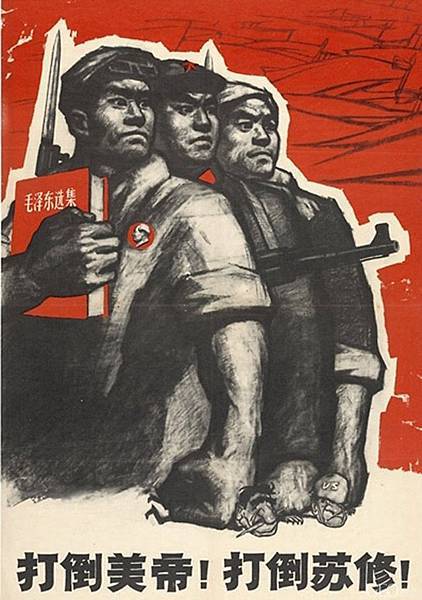
Propaganda poster, 1969. The caption says “Defeat Imperialist US! Defeat Social Imperialism!” The book’s name is “Quotations from Mao Zedong”. (Source)
Where did that list of traits I’ve written com from? Fair like jade, frail ... why are they so far from the ... “macho”ness of the men in the poster?
What has Chinese history said about its beautiful men?
Wei Jie (衛玠 286-312 BCE), one of the four most beautiful ancient Chinese men (古代四大美男) recorded in Chinese history famously passed away when fans of his beauty gathered and formed a wall around him, blocking his way. History recorded Wei as being frail with chronic illness, and was only 27 years old when he died. Arguably the first historical account of “crazy fans killing their idol”, this incident left the idiom 看殺衛玠 ~ “Wei Jie being watched to death.” ~ a not very “macho” way to die at all.
潘安 (Pan An; 247-300 BCE), another one of the four most beautiful ancient Chinese men, also had hoards of fangirls, who threw fruits and flowers at him whenever he ventured outside. The Chinese idiom 擲果盈車 “thrown fruit filling a cart” was based on Pan and ... his fandom, and denotes such scenarios of men being so beautiful that women openly displayed their affections for them.
Meanwhile, when Pan went out with his equally beautiful male friend, 夏侯湛 Xiahou Zhan, folks around them called them 連璧 ~ two connected pieces of perfect jade. Chinese Jade is white, smooth, faintly glowing in light, so delicate that it gives the impression of being somewhat transparent.
Aren’t Wei Jie and Pan An reminiscent of modern day Chinese idols, the “effeminate” “Little Fresh Meat”s (小鲜肉) so panned by Article O3? Their stories, BTW, also elucidated the historical reference in LWJ’s description of being jade-like in MDZS, and in WWX and LWJ being thrown pippas along the Gusu river bank.
Danmei, therefore, didn’t create a trend of androgynous beauty in men as much as it has borrowed the ancient, traditional definition of masculine Chinese beauty ~ the beauty that was more feminine than masculine by modern standards.
[Perhaps, CPs should be renamed 連璧 (”two connected pieces of perfect jade”) as a reminder of the aesthetics’ historical roots.]
Someone may exclaim now: But. But!! Yet another one of the four most beautiful ancient Chinese men, 高長恭 (Gao Changgong, 541-573 BCE), far better known by his title, 蘭陵王 (”the Prince of Lanling”), was a famous general. He had to be “macho”, right?
... As it turns out, not at all. Historical texts have described Gao as “貌柔心壮,音容兼美” (”soft in looks and strong at heart, beautiful face and voice”), “白美類婦人” (”fair and beautiful as a woman”), “貌若婦人” (”face like a woman”). Legends have it that The Prince of Lanling’s beauty was so soft, so lacking in authority that he had to wear a savage mask to get his soldiers to listen to his command (and win) on the battlefield (《樂府雜錄》: 以其顏貌無威,每入陣即著面具,後乃百戰百勝).
This should be emphasised: Gao’s explicitly feminine descriptions were recorded in historical texts as arguments *for* his beauty. Authors of these texts, therefore, didn’t view the feminisation as insult. In fact, they used the feminisation to drive the point home, to convince their readers that men like the Prince of Lanling were truly, absolutely good looking.
Being beautiful like a women was therefore high praise for men in, at least, significant periods in Chinese history ~ periods long and important enough for these records to survive until today. Beauty, and so it goes, had once been largely free of distinctions between the masculine and feminine.
One more example of an image of an ancient Chinese male beauty being similar to its female counterpart, because the history nerd in me finds this fun.
何晏 (He Yan, ?-249 BCE) lived in the Wei Jin era (between 2nd to 4th century), during which makeup was really en vogue. Known for his beauty, he was also famous for his love of grooming himself. The emperor, convinced that He Yan’s very fair skin was from the powder he was wearing, gave He Yan some very hot foods to eat in the middle of the summer. He Yan began to sweat, had to wipe himself with his sleeves and in the process, revealed to the emperor that his fair beauty was 100% natural ~ his skin glowed even more with the cosmetics removed (《世說新語·容止第十四》: 何平叔美姿儀,面至白。魏明帝疑其傅粉,正夏月,與熱湯餅。既啖,大汗出,以朱衣自拭,色轉皎然). His kick-cosmetics’-ass fairness won him the nickname 傅粉何郎 (”powder-wearing Mr He”).
Not only would He Yan very likely be mistaken as a woman if this scene is transferred to a modern setting, but this scene can very well fit inside a Danmei story of the 21st century and is very, very likely to get axed by the Chinese censorship board for its visualisation.
[Important observation from this anecdote: the emperor was totally into this trend too.]
The adjectives and phrases used above to describe these beautiful ancient Chinese men ~ 貌柔, 音容兼美, 白美, 美姿儀, 皎然 ~ have all become pretty much reserved for describing beauty in women nowadays. Beauty standards in ancient China were, as mentioned before, had gone through significantly long periods in which they were largely genderless. The character for beauty 美 (also in Danmei, 耽美) used to have little to no gender association. Free of gender associations as well were the names of many flowers. The characters for orchid (蘭) and lotus (蓮), for example, were commonly found in men’s names as late as the Republican era (early 20th century), but are now almost exclusively found in women’s names. Both orchid and lotus have historically been used to indicate 君子 (junzi, roughly, “gentlemen”), which have always been men. MDZS also has an example of a man named after a flower: Jin Ling’s courtesy name, given to him by WWX, was 如蘭 (”like an orchid”).
A related question may be this: why does ancient China associate beauty with fairness, with softness, with frailty? Likely, because Confucianist philosophy and customs put a heavy emphasis on scholarship ~ and scholars have mostly consisted of soft-spoken, not muscular, not working-under-the-sun type of men. More importantly, Confucianist scholars also occupied powerful government positions. Being, and looking like a Confucianist scholar was therefore associated with status. Indeed, it’s very difficult to look like jade when one was a farmer or a soldier, for example, who constantly had to toil under the sun, whose skin was constantly being dried and roughened by the elements. Having what are viewed as “macho” beauty traits as in the poster above ~ tanned skin, bulging muscles, bony structures (which also take away the jade’s smoothness) ~ were associated with hard labour, poverty and famine.
Along that line, 手無縛雞之力 (“hands without the strength to restrain a chicken”) has long been a phrase used to describe ancient scholars and students, and without scorn or derision. Love stories of old, which often centred around scholars were, accordingly, largely devoid of the plot lines of husbands physically protecting the wives, performing the equivalent of climbing up castle walls and fighting dragons etc. Instead, the faithful husbands wrote poems, combed their wife’s hair, traced their wife’s eyebrows with cosmetics (畫眉)...all activities that didn’t require much physical strength, and many of which are considered “feminine” nowadays.
Were there periods in Chinese history in which more ... sporty men and women were appreciated? Yes. the Tang dynasty, for example, and the Yuan and Qing dynasties. The Tang dynasty, as a very powerful, very open era in Chinese history, was known for its relations to the West (via the Silk Road). The Yuan and Qing dynasties, meanwhile, were established by Mongolians and Manchus respectively, who, as non-Han people, had not been under the influence of Confucian culture and grew up on horsebacks, rather than in schools.
The idea that beautiful Chinese men should have “macho” attributes was, therefore, largely a consequence of non-Han-Chinese influence, especially after early 20th century. That was when the characters for beauty (美), orchid (蘭), lotus (蓮) etc began their ... feminisation. The Chinese Communist Party (CCP), which started its reign of the country starting 1949, also has foreign roots, being a derivative of the Soviets, and its portrayal of ideal men has been based on the party’s ideology, painting them as members of the People’s Liberation Army (Chinese army) and its two major proletariat classes, farmers and industrial workers ~ all occupations that are “macho” in their aesthetics, but held at very poor esteem in ancient Chinese societies. All occupations that, to this day, may be hailed as noble by Chinese women, but not really deemed attractive by them.
Beauty, being an instinct, is perhaps much more resistant to propaganda.
If anything, the three terms Article O3 used to describe “effeminate” men ~ 奶油小生 “cream young men” (popularised in 1980s) , 花美男 “flowery beautiful men” (early 2000s), 小鲜肉 “little fresh meat” (coined in 2014 and still popular now) ~ only informs me how incredibly consistent the modern Chinese women’s view of ideal male beauty has been. It’s the same beauty the Chinese Communist Party has called feminine. It’s the same beauty found in Danmei. It’s the same beauty that, when witnessed in men in ancient China, was so revered that historians recorded it for their descendants to remember. It doesn’t mean there aren’t any women who appreciate the "macho” type ~ it’s just that, the appreciation for the non-macho type has never really gone out of fashion, never really changed. The only thing that is really changing is the name of the type, the name’s positive or negative connotations.
(Personally, I’m far more uncomfortable with the name “Little fresh meat” (小鲜肉) than 老婆 (wife). I find it much more insulting.)
Anyway, what I’d like to say is this: feminisation in Danmei ~ a genre that, by definition, is hyper-focused on aesthetics ~ may not be as "problematic” in Chinese as it is in English, because the Chinese tradition didn’t make that much of a differentiation between masculine and feminine beauty. Once again, this isn’t to say such mis-gendering isn’t disrespectful; it’s just that, perhaps, it is less disrespectful because Chinese still retains a cultural memory in which equating a beautiful man to a beautiful woman was the utmost flattery.
I must put a disclaimer here: I cannot vouch for this being true for the general Chinese population. This is something that is buried deep enough inside me that it took a lot of thought for me to tease out, to articulate. More importantly, while I grow up in a Chinese-speaking environment, I’ve never lived inside China. My history knowledge, while isn’t shabby, hasn’t been filtered through the state education system.
I’d also like to point out as well, along this line of thought, that in *certain* (definitely not all) aspects, Chinese society isn’t as sexist as the West. While historically, China has periods of extreme sexism against women, with the final dynasties of Ming and Qing being examples, I must (reluctantly) acknowledge Chairman Mao for significantly lifting the status of women during his rule. Here’s a famous quote of his from 1955:
婦女能頂半邊天
Women can lift half the skies
The first marriage code, passed in 1950, outlawed forced marriages, polygamy, and ensured equal rights between husband and wife. For the first time in centuries, women were encouraged to go outside of their homes and work. Men resisted at first, wanting to keep their wives at home; women who did work were judged poorly for their performance and given less than 50% of men’s wage, which further fuelled the men’s resistance. Mao said the above quote after a commune in Guizhou introduced the “same-work-same-wage” system to increase its productivity, and he asked for the same system to to be replicated across the country. (Source)
When Chairman Mao wanted something, it happened. Today, Chinese women’s contribution to the country’s GDP remains among the highest in the world. They make up more than half of the country’s top-scoring students. They’re the dominant gender in universities, in the ranks of local employees of international corporations in the Shanghai and Beijing central business districts—among the most sought after jobs in the country. While the inequality between men and women in the workplace is no where near wiped out — stories about women having to sleep with higher-ups to climb the career ladder, or even get their PhDs are not unheard of, and the central rulership of the Chinese Communist Party has been famously short of women — the leap in women’s rights has been significant over the past century, perhaps because of how little rights there had been before ~ at the start of the 20th century, most Chinese women from relatively well-to-do families still practised foot-binding, in which their feet were literally crushed during childhood in the name of beauty, of status symbol. They couldn’t even walk properly.
Perhaps, the contemporary Chinese women’s economic contribution makes the sexism they encounter in their lives, from the lack of reproductive rights to the “leftover women” label, even harder to swallow. It makes their fantasies fly to even higher, more defiant heights. The popularity of Dangai right now is pretty much driven by women, as acknowledged by Article O3. Young women, especially, female fans who people have dismissed as “immature”, “crazy”, are responsible for the threat the Chinese government is feeling now by the genre.
This is no small feat. While the Chinese government complains about the “effeminate” men from Danmei / Dangai, its propaganda has been heavily reliant on stars who have risen to popularity to these genres. The film Dd is currently shooting, Chinese Peacekeeping Force (維和部隊), also stars Huang Jingyu (黄景瑜), and Zhang Zhehan (張哲瀚) ~ the three actors having shot to fame from The Untamed (Dangai), Addicted (Danmei), and Word of Honour (Dangai) respectively. Zhang, in particular, played the “uke” role in Word of Honour and has also been called 老婆 (wife) by his fans. The quote in Article O3, “Ten years as a tough man known by none; one day as a beauty known by all” was also implicitly referring to him.
Perhaps, the government will eventually realise that millennia-old standards of beauty are difficult to bend, and by extension, what is considered appropriate gender expression of Chinese men and women.
In the metas I’ve posted, therefore, I’ve hesitated in using terms such as homophobia, sexism, and ageism etc, opting instead to make long-winded explanations that essentially amount to these terms (thank you everyone who’s reading for your patience!). Because while the consequence is similar—certain fraction of the populations are subjected to systemic discrimination, abuse, given less rights, treated as inferior etc—these words, in English, also come with their own context, their own assumptions that may not apply to the situation. It reminds me of what Leo Tolstoy wrote in Anna Karenina,
“All happy families are alike; each unhappy family is unhappy in its own way.”
Discrimination in each country, each culture is humiliating, unhappy in its own way. Both sexism and homophobia are rampant in China, but as their roots are different from those of the West, the ways they manifest are different, and so must the paths to their dissolution. I’ve also hesitated on calling out individual behaviours or confronting individuals for this reason. i-Danmei fandoms are where i-fans and c-fans meet, where English-speaking doesn’t guarantee a non-Chinese sociopolitical background (there may be students from China, for example; I’m also ... not entirely Western), and I find it difficult to articulate appropriate, convincing arguments without knowing individual backgrounds.
Frankly, I’m not sure if I’ve done the right thing. Because I do hope feminisation will soon fade into extinction, especially in i-Danmei fandoms that, if they continue to prosper on international platforms, may eventually split from c-Danmei fandoms along the cultural (not language) line due to the vast differences in environmental constraints. My hope is especially true when real people are involved, and c-fandoms, I’d like to note, are not unaware of the issues surrounding feminisation ~ it has already been explicitly forbidden in BJYX’s supertopic on Weibo.
At the same time, I’ve spent so many words above to try to explain why beauty can *sometimes* lurk behind such feminisations. Please allow me to end this post with one example of feminisation that I deeply dislike—and I’ve seen it used by fans on Gg as well—is 綠茶 (”green tea”), from 綠茶婊 (”green tea whore”) that means women who look pure / innocent but are, deep down, promiscuous / lustful. In some ways, its meaning isn’t so different from Daji 妲己, the consort blamed for the fall of the Shang dynasty. However, to me at least, the flattery in the feminisation is gone, perhaps because of the character “whore” (婊), because the term originated in 2013 from a notorious sex party rather than from a legendary beauty so maligned that The Investiture of the Gods (封神演義), the seminal Chinese fiction written ~2,600 years after Daji’s death, re-imagined her as a malevolent fox spirit (狐狸精) that many still remembers her as today.
Ah, to be caught between two cultures. :)
226 notes
·
View notes
Note
Hiya! I've only just started watching Chinese dramas and the drama behind the drama is already blowing my Western mind. Thanks for your meta btw! I was thinking about what you said about Chinese government not explicitly banning anything, rather people had BETTER catch on to what they mean 😨 Is it possible that delaying OOL is their way of warning future productions to think twice before involving Xiao Zhan, because they want to undermine his popularity? As he is 'too entertaining' 💀
Hiya Anon!! The decision to air a c-drama lies in both the government and the platforms. Once the drama gets the distribution permit from the National Radio and Television Administration (NRTA), it's up to the platforms to schedule the airing date.
The distribution permit for OOL was issued in May 2020, and so the government cleared it for airing a while ago. And so, it is the platforms that are holding the airing date back.
Multiple considerations go into the decision of when to air any drama. Here are some financial considerations I can think of: are there fierce competitors in the same period? It's usual for multiple c-dramas to begin airing on similar dates. The week between 2019/06/23 and 2019/06/30, for example, 9 series began airing—including The Untamed on 2019/06/27. And on that very same date, another prominent, very well-made drama also began its airing—The Longest Day in Chang'An 長安十二時辰).
And then, has a popular drama of a similar genre been aired right before? If so, it may be wise to push back the airing date a little. Is it exam period or is it summer, with students being on vacation and having more free time to watch TV, chase after their favourite idols and buy merchandises? That’s the golden season for idol dramas! Are the production studios, platforms under pressure to produce a solid profit report to their investors? Better move a series with very bankable stars then ...
Afterwards, there are, of course, political considerations. For those who may be worried about c-ent’s current upheaval, I’d like to emphasise this: the government swooping in and say, or hint, that this and that popular thing displeases its Socialist sensibilities isn’t new. Dangai isn’t the first genre to be soft-banned, for example; before that, there was the ... Imperial Harem infighting genre 宮鬥劇 (sorry for the silly translation, I don’t know what’s the proper name for it!), which was extremely popular at the time of the ban with recent hits such as The Legend of Zhen Huan 後宮甄嬛傳 and Story of Yanxi Palace 延禧攻略. There was the time travel genre 穿越劇 (For example, Scarlet Heart 步步驚心). The state criticism against “sissy” 娘炮 idols also made its former round in 2018.
And so, while there may not have been precedences where the government targets c-ent’s obsession with “traffic” 流量—a relatively new term that describes the heavy flow of social media posts, of buzz and cash surrounding a beloved something or someone, c-ent has a long history of, and ample experiences with, dealing with their government’s displeasure at something that its audience loves, that is financially lucrative for the industry and most importantly, along that line, something the industry wishes to keep.
The last point may be worth emphasising: the production studios, the platforms (streaming, social media etc), the marketing companies, the yxh, the companies who employ celebrities as their spokespeople etc etc, all of them desperately want to keep stars like Gg and Dd around. This is especially true with c-ent being in its “bitter cold winter” financially since 2018, with the tightening censorship that means hit dramas, and "top traffic” 頂流 stars, are increasingly more difficult to make or come by. “Top traffic” stars, in particular, are very attractive to the industry because their fans are (far) more willing to spend money, generate the needed buzz on social media to bring in more “passer-by” audience and in turn, more revenue, and more investment, and more endorsements and sponsorships (see: the number of Dd commercials in SDOC4).
Therefore, as fans and audience, I think it’s safe to assume this: at least on the front of wishing to protect Gg and Dd’s star status, to protect potentially popular dramas and genres such as OOL, these financial interests stand with us. Does this “saving” go against what is safe for these companies? One can say so. It would be safer for the platforms, for example, to air ... um, say, The Best Speeches by President Xi in place of dramas like OOL. The act would likely please the government very much; signal, perhaps, that the platforms have caught on its ultimate dream, with Xi being the One Idol of China. But this decision would also go against the very nature of these companies as for-profit entities, these Capitalist Existence that are traded in stock markets and are driven to make as much money and as quickly as they can.
What, then, is the easiest way to protect traffic stars like Gg and Dd, like Yang Zi 楊紫, the lead actress of OOL who is also very popular and who, reportedly, also has her own rather ... rambunctious corner of fandom? What’s the easiest way to “save” a potentially popular drama like OOL? Saying what is *the* easiest way may be difficult, but I believe I can name one easy way: to simply keep these popular people, these (potentially) popular things out of attention for a while, especially with October 1st (Communist China’s birthday) drawing near and in 2021, the year of the Chinese Communist Party’s Centennial.
After all, regulations from the Chinese government tend to come in bursts—axes falling left, right and centre for a while and in quick succession, followed by an extended period of silence (and neglect). The wait, therefore, doesn’t have to be long at all. As short as after a few month’s time, certain parts of c-ent may return to what it was like before and these c-ent companies, having had so much experience in working around situations like this, would know when that time comes, when the coast is clear.
Meanwhile, as fans, we wait. Being in i-fandom means our words and actions have relatively little effect, but if we were in China, our best action would, too, likely be similar to the platforms that delay the airing of OOL, except we cross out the the word “popular” and replace it with “beloved”: we keep our beloved people, our beloved things out of attention. We refrain from going around and complaining, no matter how much we wish to watch the show. We refrain from starting fights. We stay out of hot searches. The Chinese government is bureaucratic and corruption is rampant, which means often times, the higher-ups in charge of dropping the axes have little knowledge about who or what their axes are supposed to fall on, and little care if they get it wrong. In such circumstances, the key to survival is to not stick one’s head out; to make sure we don’t offer our neck, and more importantly, our favourite stars’ neck, for the axes to fall on.
It may be difficult sometimes. We’ll hear hisses, from antis, from doubters, from those who simply aren’t familiar with the situation, that will tempt us to put ourselves and our favourite stars out in the open where the axes are raining. Patience and independent thinking are important in times like this, qualities that allows us to stop, excuse ourselves from the virtual crowd and think ~ wait, is what is being said true?
The government’s attack on “traffic”, for example, together with the soft-ban on Dangai, have led to soft hisses that Gg and Dd are the targets.
I invite everyone to step back and think a little—are they?
Here’s one small, but important point that may be lost in translation (and lost, too, even in some Chinese discussions where netizens have scrolled through their feeds too quickly): in the state opinion pieces, the term used against “traffic” stars has consistently been “唯流量”, with 流量 = traffic, and 唯 = only. The presence of the character 唯 is crucial: 唯流量 are not simply “traffic”, or popular stars; they are stars with only traffic, with nothing but traffic. No acting skills, no singing or dancing skills, no other demonstrated capabilities beyond getting their fans to vote and comment and buy things for them.
Are Gg and Dd 唯流量?
Here’s Gg:
youtube
(For those who may not know: A Dream Like A Dream 如夢之夢 is not just a Chinese language play. A Chinese adjective that has been used to describe it is 殿堂級 ~ “palace hall grade”, ie, it’s a royalty. Trivia: the version in China ends with a cappella with Patient #5 singing about himself, which means Patient #5 can ruin the finale of the 8 hour show if he fails to sing well, and beautifully.)
And here’s Dd:
youtube
I think I can rest my case. My fellow turtles, what do you think?
Such rumours—that so and so, this and that are the alleged targets—are currently running rampant on Chinese social media, with almost every noteworthy celebrity and media projects etc being named by a few who dislike them. However—or rather, ironically, one may say?—because everyone and everything under the sun has been named, the net effect is not that different from if nothing has been named at all.
If a similar rumour, if more of such rumours creep onto the shores of i-fandom, therefore, please do not be afraid and remember—these speculations, these noises will most likely fade into obscurity unless the populous Gg+Dd fandom amplify it with their voices, even if theses voices are words of defence.
Silence can be a defence. Silence can be the best defence.
For the time being, with the greater sociopolitical environment being what it is, with “Capital” being reportedly targeted by the state (previously discussed here), platforms and TV stations that are part of Capital may be extra careful and temporarily keep all traffic stars out of their productions, out of sight.
But I remind myself this ~ this isn’t about Gg and Dd. This probably isn’t about 99.9% of the stars who may be temporarily kept out of these productions in the coming weeks, some of whom may have starred in Dangai. As a corollary, I find it important to remind myself that too, to think twice before wondering aloud who may be the targets, to make sure I do not, even accidentally, put any non Gg Dd star and their fans under the axes—not because my words can influence the Chinese government, but rather, because of a simple, almost cliché reason: Do not do unto others what you do not want others do unto you.
After all, one step outside fandom, people cannot tell one idol from another, cannot tell one drama from another, cannot tell cpfs from solos ...
As fans of c-ent, we’re in this together. ❤️💛💚
47 notes
·
View notes
Text
I’ve got several asks about BJYX supertopic’s recent battle for the top CP ranking. I’ve meant to answer them the way they’re asked, but the answer gets long. Dear Anons ~ please forgive me for splitting the answers into multiple posts!
As with everything I’ve said about CPs, they’re mostly my limited observations—unlike history and news, it’s impossible to find articles about any of this that pass journalistic standards. Therefore, please consider the following to be my personal impressions and ramblings, and as usual, everyone please feel free to point out mistakes and add your own thoughts!
Everyone probably knows already, but the new drama that has brought waves to the Weibo’s CP ranking list is Word of Honour (山河令, which I will abbreviate to WoH), and the CP pairing is known as Lang Lang Ding (浪浪釘, LLD). I haven’t watched this drama yet but as a Wuxia (and slash) fan, it is on my to-watch list. Nonetheless, I’ve been watching the developments surrounding the popularity of the drama and the CPs, and I think I can make the posts long enough just with these observations alone. (I’m incredibly long winded :D )
For the CP competition, I think it’s important to point this out: the LLD supertopic is a mixed character-CP and real-person-CP supertopic, unlike the YiZhan supertopics (BJYX, ZSWW, LSFY) that are real-person-CP only. This means comparing LLD and the YiZhan supertopics is really … comparing apples and oranges, especially when WoH is still airing (and therefore providing fresh candies for the character CP with every new episode). I therefore wish this kind of popularity competition doesn’t take root in the international fandom; it’s … a bit silly to me, really. It makes little sense.
That said, however, I understand why c-turtles are fighting so hard for the #1 CP spot. C-ent (as is true with many other aspects in the country), numbers and ranking are everything. That 20(?), 40(?) minutes during which BJYX supertopic fell to #2 the first time already made “news” headlines that claimed that WoH had surpassed The Untamed (TU)—an even stranger comparison, if one thinks about it. BJYX, technically speaking, doesn’t have anything to do with TU. It’s a GG/DD real person CP.
But it doesn’t matter—numbers are numbers, and they talk to c-ent watchers, the commercial interests looking for their most promising future investments. The perceived power of c-turtles hinges on them and by power, I mean both fan power and spending power, which are almost synonymous terms in c-ent. Many of you have probably seen those charts that rank the popularity of c-ent entertainers by how much goods, in monetary value, they’re able to sell. How much do the c-turtles contribute to these monetary values? Are they, as a collection of fans, worth keeping, worth wooing?
The notion that only the fan’s spending power means something may cause unease in many i-turtles—and it is, indeed, a very cold-hearted assessment, as it implies that fans are little more than living wallets to be emptied. My observations have been that such a notion doesn’t bother c-turtles for the most part and, IMHO, they’re being realistic for their sociopolitical environment. They also respond to this notion accordingly—while it is difficult to tease out the exact percentage of turtles among Gg and Dd’s active fans (fans that make major purchases goods and merchandises), c-turtles have previously demonstrated their ability to contribute a substantial fraction (in the 10s of percent) of money spent on Gg and Dd. As these splits are only very occasionally visible to the public, the CP ranking likely serves as a constant reminder of c-turtles enormous fan/spending power — without which, Gg and Dd’s popularity will also take a hit.
In that sense, c-turtles are fighting for their right-to-exist. Remember when I talked about the “traditional” thinking that CPFs < solos, and that one CPF = one (loyal) solo lost? This means c-turtles must be able to demonstrate their ability to offer something that the solos cannot, and more importantly, that their offer will not come in any other name. If c-turtles proved last year that they wouldn’t change their name to solos, then this year they’re set to prove they’ll not change their name to LLDs or other CPFs.
If the latter sounds a bit like a battlecry, it may be exactly that. Ever since the announcements of the long line of upcoming Dangai’s, ample inflammatory posts have been made on the platform to get c-turtles to “defect” to the new dramas, or predict that as soon as another pair of random, beautiful men start to throw candies on screen, c-turtles will promptly forget about Gg and Dd and join the fun. The latter, especially, can be quite insulting to read, as one can imagine. However, with c-turtles being a loosely connected group of millions, despite their apparent firm stance that they shall stay turtle, their underlying nerves that these “insults” may turn out to be true can also be felt — the worry that c-turtledom will haemorrhage when the next popular Dangai with enticing M/M CPs (character or real person) come along.
WoH, as the first drama that fits the criteria, is therefore a test— a test that many c-turtles likely view they must pass with flying colours to prove their point, to stand with their heads held high among those who do not care about BJYXSZD (not necessarily solos—many solos, BTW, have actually helped the turtles out this time); to show that turtles are not only every bit as loyal as other Gg and Dd fans, they’re not so … cheap as to take any random “industrial saccharine” (工業糖精; referring to ZQSG-free candies created solely to lure in fans) and walk away.
The reform of the BJYX supertopic (which now allows candy analysis and explains the sudden appearance of many old candies), the flood of BTS videos from almost every Zhan Jie previously involved with the YiZhan CPs, the temporary retaking of the top 3 CP spots by BJYX+ZSWW+LSFY ... can therefore be viewed as a rally of c-turtles. The message is: we’re not going anywhere. We’ve got enough candies that no other (M/M) CPs can hope to match in quantity, in quality.
(And the parade is indeed impressive.)
(The reform also didn’t come out of thin air; there have been discussions about the supertopic’s candy sharing rules before.)
Some c-turtles have rightfully been concerned about how such a parade of candies can affect Gg and Dd. They point out that some candies should still remain 閱後即焚 (“burn after reading”, instant return to hiding after release like certain BTS videos); that at some point, c-turtles have to let go of their obsession of staying on top of the CP rankings. TU is already almost 2 years old, and being a little lower on the CP ranking list will take the heat off the YiZhan fandoms in the long run, incite less outside forces trying to fan the flames between the shrimps and the motors and the turtles.
The rules and guidelines of c-turtledom therefore remain a work in progress, and c-turtles, the millions of them, are still learning as they go.
Personally, I have faith in what will come. I also haven’t been too concerned about the candy parade, because most information is already out there for those who’re determined to find them — on Bilibili, Douyin, Zhihu etc. I spent some time talking about the Gg Assistant fic not with the goal of eliciting pain or panic, but rather, as a demonstration of why it has been the tradition of CPFs—not only the turtles—to play things very cautiously, with 閱後即焚 and 圈地自萌 (“to play within the circle”; ie, keep all information and candies within CPFs) being the default rules even after removing the “queer factor” from the discussion. Real person CPs have fate as one of their writers and so, unlike character CPs, their candies can have unintended, unpredictable consequences. As the YiZhan fandoms have now grown big enough that their candies can no longer be realistically well-contained, it may not be such a bad idea for especially the sensitive candies to return under the “jurisdiction” of the BJYX supertopic, so to speak. c-turtles can then gain better control of their comes-and-goes. Their narratives.
(CPN below.)
About narratives. @rainbowsky have previously written a thoughtful piece on the possible reasons the YiZhan fandoms have been allowed to thrive, and I’d like to add the following hypothesis—it may be a way to take pre-emptive control of the Gg/Dd narrative in preparation for the scenario where their relationship is exposed without their consent. Some i-turtles, I think, may have already gained a sense of how ruthless, cruel and above all, quick the c-ent rumour mill can be. If Gg and Dd get outed by a third party, chances are they won’t have time at all to create a fresh narrative, and the one that come out of the rumour mill will likely be … very ugly, containing every worst misconception people have against homosexual relationships. Whereas now, c-turtles already have a narrative at hand—the canon-fanon that, while c-turtles may not agree on every detail, is largely agreed upon on the important milestones. The supporting materials are also ready: the videos, the images, the voice and arrow guides on them.
For me, another interesting question is whether this c-turtle rally and parade of candies are truly necessary in the end.
I’m curious about what will happen to the LLD supertopic when WoH completes its airing. There’s really no precedence for this kind of a mixed character + real person M/M CP supertopic setup — the history of Dangai is short, of popular Dangai’s, even shorter.
Guardian (鎮魂), the first successful Dangai aired exactly a year before TU (in the summer of 2018), never had a dedicated CP supertopic (please holler if I got this wrong! I know there’re Guardian fans here ~ hello! *waves*). Discussions of Guardian’s CPs were found within the drama’s supertopic (剧版镇魂); the real-person-CP also never had its own name; its discussions were hidden under the character CP (巍瀾) tag.
Then came TU. Its real person CP (BJYX) split away from its character CP (WangXian) long before the airing for the drama—the birthdate of the BJYX supertopic was 2018/04/28 (TU’s airing date: 2019/06/27).
After TU, two Dangai dramas have already aired before WoH that seemed to have largely passed the attention of i-fandom: The Sleuth of the Ming Dynasty (成化十四年) and Winter Begonia (鬢邊不是海棠紅). Winter Begonia, in particular, was well received. Their character CPs never really took off, however, being conceived and perceived as more brotherhood than romance. Age also played a factor for Winter Begonia—Yun Zheng (尹正), known to many turtles as Dd’s motorcycle buddy, is 34, and Huang Xiaoming (黃曉明) is 43. The associated real person CPs also never became popular as a result; Huang Xiaoming’s famous marriage to a beautiful actress also meant that a real person CP was likely to be off the table for Winter Begonia from the start.
The best reference I can think of then, when it comes to speculating the fate of LLD, is therefore the fates of the CP supertopics of 2020’s summer hit, Love and Redemption (琉璃). I’ve talked about its character CP before; essentially, just days after the drama was done airing, the (het) character CP (初遇夫婦) was broken up and in a manner largely criticised as unnecessarily cruel to CP fans. Its supertopic closed immediately afterwards. The supertopic for the real-person-CP (冰橙汁) got to live, however, and is still active today.
The commercial forces behind WoH will likely break the character CP as soon as the drama is done airing; popular het and non-het character CPs in the recent years have gone through similar fates. What does this mean to LLD then? Does it mean the supertopic will be shutdown, since the drama itself already has its own supertopic? But what will happen then to its real-person CP, which has been incorporated within the LLD supertopic? Will the real-person CP be broken at the same time as the character CP to allow for immediate “purification” of real person CP fans into solo fans, to avoid future “headaches” like BYYX—a bound between the actors that cannot be severed—or 227 that, in the eyes of many passerbys, remains an issue of solo vs cpfs?
Only time will tell, and I very sincerely hope it’ll get a happy ending. Fans are made to love, and it saddens me every time to see them being severed from their loves, or pitted against each other especially when it’s clear it’s the social media platforms, the commercial interests behind the scenes — not just the production/media companies but the YXHs, the water armies — who will reap the benefits in the end. Personally, I feel no joy in seeing anyone’s favourites getting torn down, even if they aren’t my own. Gg and Dd’s safety — and the safety of every upstanding, hardworking c-ent entertainer like them — doesn’t hinge so much on their CP or solo or drama ranking, but whether their fans can refrain from bringing their conflicts into the public eye, from “occupying social resources”—ie, deflecting the public’s attention from the “core socialist values” the government intends it to focus on.
Fandom is big enough for us all.
141 notes
·
View notes